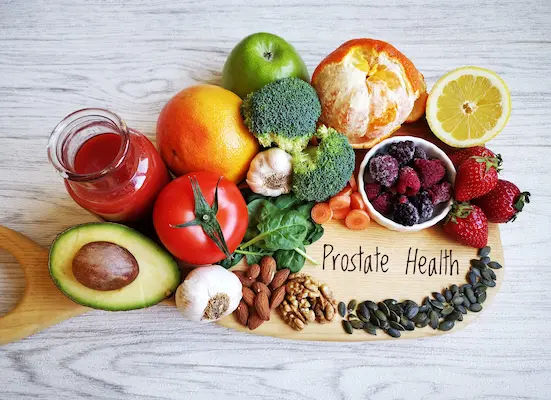Diet Role In Preventing Enlarged Prostate
Discover how a healthy diet can support prostate health and help prevent enlargement. Learn which foods promote a healthy prostate.

Written by Dr. Rohinipriyanka Pondugula
Reviewed by Dr. D Bhanu Prakash MBBS, AFIH, Advanced certificate in critical care medicine, Fellowship in critical care medicine
Last updated on 13th Jan, 2026

Introduction
For many men, the thought of an enlarged prostate, or Benign Prostatic Hyperplasia (BPH), can be a source of anxiety. The symptoms of frequent urination, weak stream, and sleepless nights can significantly impact quality of life. While age and genetics are primary risk factors, emerging research highlights a powerful factor within our control: our diet. The foods we choose to eat every day play a crucial role in either fueling inflammation and hormonal imbalances or fighting them. This article isn't about a magical cure; it's about empowerment. We will explore how a strategic dietary approach, rich in specific nutrients and anti-inflammatory foods, can be a potent tool in preventing and managing an enlarged prostate. We’ll break down the science, provide a practical food guide, and help you build a sustainable eating plan for long-term prostate wellness.
Understanding Benign Prostatic Hyperplasia (BPH)
Knowing the basics of prostate health is crucial for men’s well-being.
What is an Enlarged Prostate?
The prostate is a walnut-sized gland located below the bladder in men. Its primary function is to produce fluid that nourishes and transports sperm. As men age, it's common for the prostate gland to enlarge. This non-cancerous growth is known as Benign Prostatic Hyperplasia (BPH). It's not a precursor to prostate cancer, but the conditions can coexist. The enlargement squeezes the urethra (the tube that carries urine out of the body), like pinching a straw, which leads to various urinary symptoms.
Common Symptoms You Shouldn't Ignore
Recognising the signs of BPH is the first step toward management. Key symptoms include:
- Frequent or urgent need to urinate, especially at night (nocturia).
- Difficulty starting urination.
- A weak or interrupted urine stream.
- Dribbling at the end of urination.
- A feeling that the bladder isn't fully empty.
If you experience any of these symptoms persistently, it's essential to consult a healthcare professional for an accurate diagnosis. If symptoms disrupt your daily life or sleep, consult a doctor online with Apollo24|7 for further evaluation and guidance.
Consult a Dietitian for the best advice
The Science Behind Food as Medicine for Your Prostate
What you eat can directly impact your prostate health.
Inflammation: The Common Enemy
Chronic inflammation is a root cause of many age-related diseases, including BPH. A diet high in processed foods, sugar, and unhealthy fats can promote systemic inflammation, which may irritate the prostate tissue and contribute to cell growth. Conversely, an anti-inflammatory diet for prostate health, rich in antioxidants and phytochemicals from plants, can help calm this internal fire, creating a less favorable environment for prostate enlargement.
Hormones and Their Dietary Influencers
Hormones, particularly testosterone and its derivative dihydrotestosterone (DHT), are key players in prostate growth. Certain foods can influence the activity of enzymes that convert testosterone to DHT. For example, compounds in plants like soy can gently modulate these hormonal pathways, potentially slowing down the proliferation of prostate cells.
Building Your Prostate-Healthy Plate: Foods to Embrace
Choosing the right foods can boost prostate health and overall wellness.
The Power of Red: Lycopene-Rich Foods
Lycopene is a potent antioxidant that gives tomatoes, watermelon, and pink grapefruit their vibrant red color. Numerous studies have linked high lycopene intake to a reduced risk of BPH and improved urinary function. The body absorbs lycopene best from cooked tomatoes (e.g., tomato sauce, paste), making a homemade marinara sauce a true prostate-supporting superfood.
Cruciferous Crusaders: Broccoli, Cauliflower, and Brussels Sprouts
These vegetables are rich in sulforaphane and other compounds that help the body detoxify potential carcinogens and may help regulate cell growth. Aim to include a serving of these best vegetables for prostate health several times a week.
Healthy Fats: The Omega-3 Advantage
Replacing saturated and trans fats with omega-3 fatty acids is a cornerstone of an anti-inflammatory diet. Fatty fish like salmon, mackerel, and sardines are excellent sources. Plant-based options include walnuts, flaxseeds, and chia seeds. These fats help reduce inflammation throughout the body.
Plant-Based Proteins: The Soy and Legume Benefit
Populations with diets high in plant-based proteins, like soy (tofu, tempeh, edamame), have lower rates of BPH. Soy contains isoflavones, which are phytoestrogens that may help balance hormones involved in prostate growth. Lentils and other legumes are also fantastic alternatives to red meat.
Zinc Powerhouses: Seeds and Shellfish
Zinc is concentrated in the prostate more than any other organ in the body and is vital for its function. While red meat contains zinc, it's better to source it from pumpkin seeds, sesame seeds, lentils, and shellfish like oysters. A handful of pumpkin seeds makes for a perfect prostate-friendly snack.
Foods to Limit or Avoid for Optimal Prostate Health
Limiting certain foods can help maintain a healthy prostate.
The Red Meat and Dairy Dilemma
A high intake of red meat and full-fat dairy has been consistently linked to an increased risk of BPH. These foods are often high in saturated fats, which can promote inflammation. Consider making red meat an occasional treat rather than a staple and opt for lean poultry, fish, or plant-based proteins instead.
Bladder Irritants: Caffeine, Alcohol, and Spicy Foods
While these don't cause the prostate to enlarge, they can irritate the bladder and worsen BPH symptoms like urgency and frequency. This is a key reason why men are often advised to cut back on coffee, tea, soda, alcohol, and very spicy foods if they are struggling with urinary comfort.
The Hidden Danger: Sugar and Refined Carbohydrates
Sugary drinks, white bread, pasta, and pastries cause rapid spikes in blood sugar and insulin, which are linked to inflammation and may influence hormonal pathways that affect prostate growth. Opting for whole grains and complex carbohydrates is a smarter choice for overall and prostate health.
Beyond Food: Hydration and Lifestyle Synergy
Prostate health isn’t just about diet; hydration and lifestyle play a key role.
The Art of Hydration: Timing is Everything
Staying hydrated is crucial, but timing matters. If nocturia (nighttime urination) is a problem, try reducing fluid intake in the hours leading up to bedtime. However, don't restrict fluids during the day, as dehydration can irritate the bladder.
The Role of Exercise and Weight Management
Regular physical activity helps with weight management, reduces inflammation, and can improve urinary symptoms. Studies show that men who are overweight or obese have a higher risk of developing BPH. Even 30 minutes of moderate exercise most days of the week can make a significant difference.
Conclusion: A Lifelong Commitment to Health
Managing your prostate health is a marathon, not a sprint. There is no single magic bullet, but the cumulative effect of daily dietary choices is profound. By embracing an anti-inflammatory diet centered on whole, plant-based foods, healthy fats, and lean proteins, you are taking proactive steps to support your prostate, reduce inflammation, and potentially mitigate the symptoms of BPH. This approach synergises perfectly with other healthy lifestyle choices like regular exercise and maintaining a healthy weight. Remember, these strategies are for prevention and management. If your condition does not improve after trying these dietary methods, or if symptoms are severe, consult a doctor for a comprehensive evaluation and personalised treatment plan. Your health is your greatest asset; nourish it wisely.
Consult a Dietitian for the best advice
Consult a Dietitian for the best advice

Ms. Neelanjana J
Dietician
5 Years • Bsc., Msc. Nutrition and Dietetics specialised general weight management, PCOS/PCOD weight loss and Diabetes management. A clinical dietitian with 4+ year experience specializing in evidence-based, result-oriented nutrition therapy. I have extensive experience in weight loss, thyroid management, PCOD/PCOS, weight gain, and diabetes & prediabetes care. My approach is personalized, practical, and sustainable—focusing on helping individuals achieve long-term lifestyle change rather than quick fixes. I work closely with clients to understand their medical history, lifestyle, and goals, and then design customized diet plans that support hormonal balance, metabolic health, and overall wellbeing. My goal is to make nutrition simple, realistic, and effective—so you see measurable results and feel your healthiest self.Auther in Health benefits of jackfruit (Artocarpus heterophyllus Lam.) seeds: A review (2023) The Pharma Innovation Journal Co- Auther in Malnutrition in Women: A review (2023) The Pharma Innovation Journal. Highfield Level 3 in HACCP. Highfield Level 4 International Award in Food Safety Managment
Bengaluru
Apollo Clinic, JP nagar, Bengaluru

Ms. Sushma Jaiswal
Dietician
42 Years • M.Sc.(Food & Nutrition)
Bengaluru
Swasthya Nutrition, Bengaluru

Dr. Eti Jain
Dietician
11 Years • MSc in Nutrition
Gurugram
Diets by Dietitian Eti, Gurugram

Ms. Sreeparna Dey Dhara Deb
Dietician
10 Years • DNHE
Bansdroni
Siddhita Healthcare., Bansdroni

Ms. Priyanka Saini
Dietician
9 Years • Msc (Food & Nutrition),NDEP
Ghaziabad
Dr. PRIYANKA SAINI'S CLINIC, Ghaziabad
Consult a Dietitian for the best advice

Ms. Neelanjana J
Dietician
5 Years • Bsc., Msc. Nutrition and Dietetics specialised general weight management, PCOS/PCOD weight loss and Diabetes management. A clinical dietitian with 4+ year experience specializing in evidence-based, result-oriented nutrition therapy. I have extensive experience in weight loss, thyroid management, PCOD/PCOS, weight gain, and diabetes & prediabetes care. My approach is personalized, practical, and sustainable—focusing on helping individuals achieve long-term lifestyle change rather than quick fixes. I work closely with clients to understand their medical history, lifestyle, and goals, and then design customized diet plans that support hormonal balance, metabolic health, and overall wellbeing. My goal is to make nutrition simple, realistic, and effective—so you see measurable results and feel your healthiest self.Auther in Health benefits of jackfruit (Artocarpus heterophyllus Lam.) seeds: A review (2023) The Pharma Innovation Journal Co- Auther in Malnutrition in Women: A review (2023) The Pharma Innovation Journal. Highfield Level 3 in HACCP. Highfield Level 4 International Award in Food Safety Managment
Bengaluru
Apollo Clinic, JP nagar, Bengaluru

Ms. Sushma Jaiswal
Dietician
42 Years • M.Sc.(Food & Nutrition)
Bengaluru
Swasthya Nutrition, Bengaluru

Dr. Eti Jain
Dietician
11 Years • MSc in Nutrition
Gurugram
Diets by Dietitian Eti, Gurugram

Ms. Sreeparna Dey Dhara Deb
Dietician
10 Years • DNHE
Bansdroni
Siddhita Healthcare., Bansdroni

Ms. Priyanka Saini
Dietician
9 Years • Msc (Food & Nutrition),NDEP
Ghaziabad
Dr. PRIYANKA SAINI'S CLINIC, Ghaziabad
More articles from Enlarged Prostate
Frequently Asked Questions
What is the single best food to shrink an enlarged prostate?
There isn't one 'best' food, but cooked tomatoes are a top contender due to their highly bioavailable lycopene content, a powerful antioxidant strongly linked to prostate health benefits.
Can drinking more water help with BPH?
Yes, but timing is key. Adequate hydration during the day is important for overall health and preventing bladder irritation. However, reducing fluids 1-2 hours before bedtime can help minimise nighttime trips to the bathroom (nocturia).
Are eggs bad for an enlarged prostate?
Eggs are not inherently bad. They are a good source of protein and nutrients. The concern with diet and BPH is more focused on high saturated fat intake. Enjoy eggs in moderation as part of a balanced diet rich in fruits and vegetables.
How long does it take for a diet change to improve prostate symptoms?
Dietary changes work gradually. You may notice some improvement in symptoms like reduced urgency within a few weeks, but significant changes to prostate health can take several months of consistent effort.
Is saw palmetto effective, and should I take it?
Saw palmetto is a popular supplement for prostate health, but clinical evidence for its efficacy is mixed. Some studies show benefits for symptom relief, while others do not. It's crucial to consult a doctor before starting any new supplement to ensure it's safe and appropriate for you, and to rule out other conditions.

.webp)
